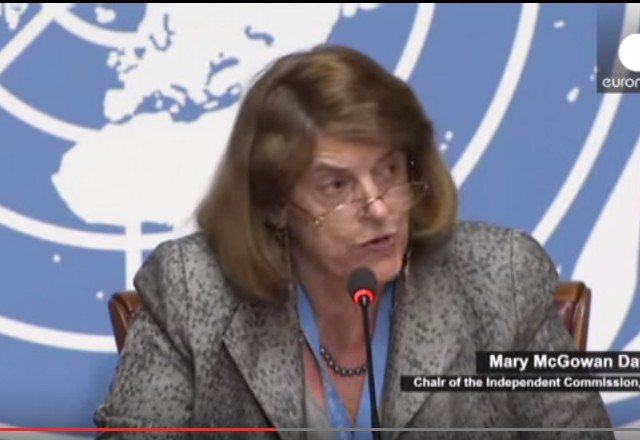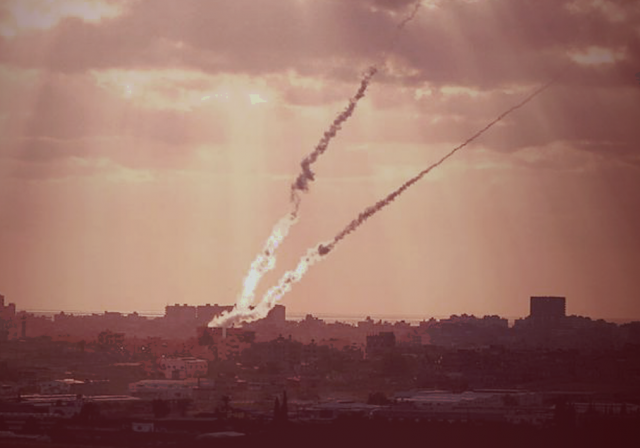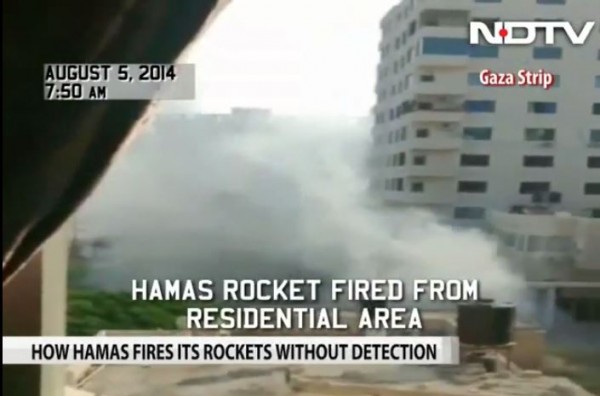Latest U.N. Gaza Report Fatally Flawed
Lack of military context and questionable conclusions.

First the good news, the so-called Schabas report, the United Nations Human Rights Council inquiry into last year’s war between Hamas and Israel, isn’t as bad as its predecessor, the infamous, discredited Goldstone report. But it’s still pretty bad.
The Schabas report is named for the judge who originally headed it, William Schabas. Schabas stepped down when it was reported that he had done paid work for the Palestinian Authority. Schabas had previously said that he wanted to see Israel’s Prime Minister Benjamin Netanyahu tried for war crimes had to step down when it was clear that he was hopelessly compromised. After he resigned the commission was headed by former New York State justice, Mary McGowan Davis.
For the most part media outlets reported that the conclusion of the report is that both sides “may have committed war crimes.”
There are two problems with this. The first is that it is inconclusive. The second and more serious one is that it put Israel and Hamas, which precipitated the conflict by launching rockets into Israel, on the same level.
The Schabas report actually did a thorough investigation of an attack that killed thirteen people mostly children at the Al Shati refugee camp in July noting that “a rocket appears to have fallen short of its target.” In other words, Hamas was responsible. (Though the report doesn’t say that explicitly.) But except the care taken in that particular case, the language was general and legal concepts were trotted out but not subject to rigorous analysis.
The weakness came from the lack of military expertise on the panel. NGO Monitor explained that the weakness of the report stemmed from its over-reliance on NGO’s with (anti-Israel) agendas instead of fact-finders who understand how the military operates.
NGO Monitor’s initial review of the Commission of Inquiry’s “detailed findings” shows that NGOs were referenced, cited, and quoted at a high volume: B’Tselem was the most referenced NGO with 69 citations, followed by Amnesty International (53), Palestinian Center for Human Rights (50), and Al Mezan (29). UNWRA and UN-OCHA were also featured throughout the report. As repeatedly demonstrated by NGO Monitor, these groups are not appropriate for professional fact-finding.
NGOs were also inexplicably sourced for factual claims beyond their capabilities. For example, the report repeats B’Tselem’s conclusions about whether individuals in Gaza “posed [] danger to other persons”; Human Rights Watch, as opposed to a military expert, was quoted with regards to the “lethal radius for a 155mm high explosive projectile”; and Breaking the Silence was cited as the basis for the specious accusation that the IDF adopted “the vast scale of destruction…as a tactic of war.”
NGO Monitor also notes that the Commission acknowledged that it could not properly investigate a number of central dimensions of the conflict. For instance, the UNHRC claimed it “was unable to verify allegations made by Israel on the use of civilian buildings by Palestinian armed groups.” Yet, at the same time the Commission “gave particular weight to first-hand testimonies” even though “it was not possible to establish with certainty the factual circumstances of a given incident.” This inconsistency is a fundamental flaw.“The lack of military expertise in the commission and the UN staff clearly hampered the investigation and the resulting publication,” continued Herzberg. “
In particular, the COI makes numerous assertions about feasible precautions, identification of military objectives, military necessity, and standards applied by reasonable commanders. In at least four independent studies by military experts, including Richard Kemp, the former head of British forces in Afghanistan, former senior US generals, and the former senior military officer for NATO, all concluded that not only did Israel exceed the requirements of international law in the Gaza Conflict but that its precautionary efforts to protect civilians were unprecedented in the history of warfare.”
Avi Issacharoff highlighted two of the low points of the report, the suggestion that the terror tunnels were legitimate and the idea that threats against Israel civilians were really warnings. (Yes that was an assertion of the report as reported by Reuters.)
To indicate that the use of tunnels by Hamas is legitimate and to assert that the group issues warnings before striking Tel Aviv are not serious claims, but rather a case of Hamas propaganda being served by researchers who don’t have the faintest idea about what is happening here, nor what is happening among Israel’s enemies.
The report notes that the probe “cannot conclusively determine the intent of Palestinian armed groups with regard to the construction and use of these tunnels. However, the commission observes that during the period under examination, the tunnels were only used to conduct attacks directed at IDF positions in Israel in the vicinity of the Green Line, which are legitimate military targets.”
With regard to warnings, the UN report risibly interpreted threats by Hamas that it would target Tel Aviv and Ben Gurion Airport as concrete warnings to Israeli civilians.
In recent weeks Israel has been preparing for the release of this report.
The Friends of Israel Initiative sponsored a multinational group of generals who reviewed Israel’s methods for targeting enemies who wrote:
“Each of our own armies is of course committed to protecting civilian life during combat. But none of us is aware of any army that takes such extensive measures as did the IDF last summer to protect the lives of the civilian population in such circumstances.”
Vanderbilt Law School Professor Willy Stern profiled the Israeli army’s legal unit, called “Dabla,” and describes the legal precautions Israel takes before carrying out a strike.
Here are just some of the steps and warnings designed to prevent civilian casualties that might take place before missiles start flying: The IDF may, variously, gather detailed intelligence on who lives in the building; call or text those who reside in a particular building with a warning that a strike is coming; drop Arabic-language leaflets over the area warning residents; fly a drone with sophisticated surveillance cameras overhead, as an extra set of eyes to make sure the civilians have vacated; drop a small charge on the roof which shakes the building, as a final warning signal that a strike is coming; and employ a highly precise and carefully chosen weapon system which, IDF lawyers and commanders hope, would destroy only the weapons cache but not surrounding rooms.
Talk about signaling your intentions to the enemy. How can any military win a war when it decides to fight this way? No matter. That is how Israel chooses to fight. In an effort to go overboard to comply with the law of armed conflict, the IDF prepared and used more than 4,000 of these target cards for planned strikes during the 50-day Gaza conflict in July and August 2014. Ben and his Dabla colleagues put a tick on every one that met their standards.
But here’s the kicker: Although most strikes were carried out without harm to innocent bystanders, IDF field commanders nixed other approved strikes in Gaza, despite these multiple layers of precautions to prevent civilian casualties. Why? “There is no symmetry in international law,” says Lt. Col. Robert Noyfield, the Dabla attorney in charge of targeting. “We do it out of moral obligation; we do it for ourselves. We are a democratic country that abides by the rule of law. By doing so, of course, we also hope to avoid criticism from the international community. How can we be faulted when abiding by the law?”
To be sure, war is violent and messy. Hamas deliberately operated in an urban environment ensuring that innocents would be hurt.
But instead of drawing a line between aggressor and victim, the commission equated the two and looked mostly at the effects of the violence, not at its causes. In war there will be collateral damage and mistakes. The rigorous application of legal principles in judging war requires much more serious analysis than the Schabas report provided.
After reading the exacting process that Israeli troops are subject to in drawing up targets, it’s hard to take the UNHRC report seriously.
[Photo: euronews (in English) / YouTube ]
 DONATE
DONATE
Donations tax deductible
to the full extent allowed by law.











Comments
“…it’s hard to take the UNHRC report seriously.”
It’s hard to take the UN. Seriously.
Get us out, get them out, isolate THEM. That should be a priority in any conservative administration.
IF we have ANY role, it should be minimal.
This is the same UN organization that’s often made up of some of the worse 3rd world countries. It’s the organization that almost was (be)headed by Saudi Arabia. Of course it’s going to be maximally anti-Israel and anti-West, adopting all of Hamas’s talking points without question.
The actions of the UN make it a laughingstock to us because the UN includes a lot of countries with lousy, tyrannical, corrupt governments. The UN exists BECAUSE most countries have lousy, tyrannical, corrupt governments, and we have been trying to tell them that there is a better way to live.
So, let’s keep the UN, and continue to point out the obvious downsides their actions.
Apart from being untrue WRT to the purpose for the UN, that makes no sense whatsoever.
The U.S. can point out anything it needs to without being part of the nest of vipers assembled in NYC.
Better, in fact, with them OFF our soil.
I don’t know if I’d put it past Hamas to prefer one of its rockets fall short and kill Palestinians rather than land in a vacant lot doing no damage.
If a rocket falls in a vacant lot, they see it as a waste.
If it falls short and kills their own people, they see it as a mistake they can’t let go to waste. Blame it on Israel, right?
“Latest U.N. Gaza Report Fatally Flawed”
I’m shocked! Say it isn’t so! Sorry I didn’t read the post, let me know when the UN produces something that ISN’T fatally flawed.
With all the input from the United Nations Rocket Warehousing Agency, I’m not surprised. They have to cover up the fact that they actively aid Hasms.